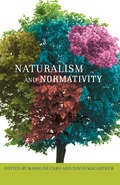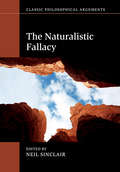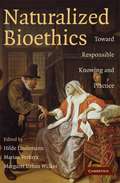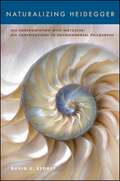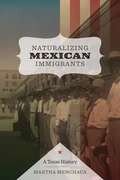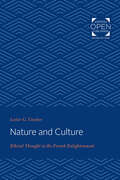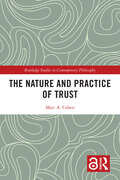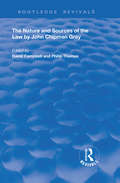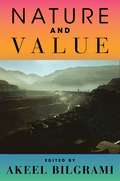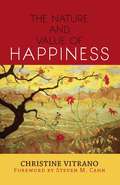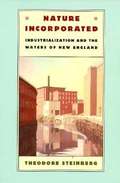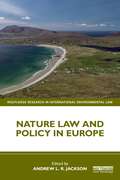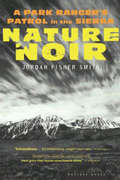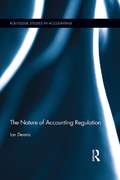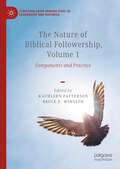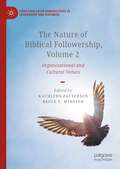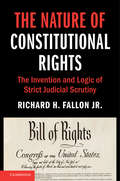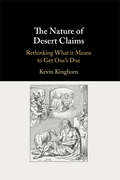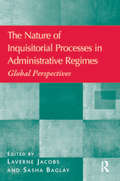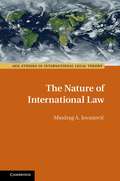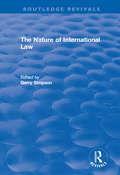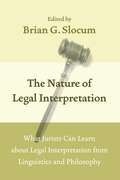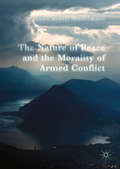- Table View
- List View
Naturalism and Normativity (Columbia Themes in Philosophy)
by David Macarthur Mario De CaroNormativity concerns what we ought to think or do and the evaluations we make. For example, we say that we ought to think consistently, we ought to keep our promises, or that Mozart is a better composer than Salieri. Yet what philosophical moral can we draw from the apparent absence of normativity in the scientific image of the world? For scientific naturalists, the moral is that the normative must be reduced to the nonnormative, while for nonnaturalists, the moral is that there must be a transcendent realm of norms.Naturalism and Normativity engages with both sides of this debate. Essays explore philosophical options for understanding normativity in the space between scientific naturalism and Platonic supernaturalism. They articulate a liberal conception of philosophy that is neither reducible to the sciences nor completely independent of them-yet one that maintains the right to call itself naturalism. Contributors think in new ways about the relations among the scientific worldview, our experience of norms and values, and our movements in the space of reason. Detailed discussions include the relationship between philosophy and science, physicalism and ontological pluralism, the realm of the ordinary, objectivity and subjectivity, truth and justification, and the liberal naturalisms of Donald Davidson, John Dewey, John McDowell, and Ludwig Wittgenstein.
Naturalism and Realism in Kant’s Ethics
by Frederick RauscherIn this comprehensive assessment of Kant's metaethics, Frederick Rauscher shows that Kant is a moral idealist rather than a moral realist and argues that Kant's ethics does not require metaphysical commitments that go beyond nature. Rauscher frames the argument in the context of Kant's non-naturalistic philosophical method and the character of practical reason as action-oriented. Reason operates entirely within nature, and apparently non-natural claims - God, free choice, and value - are shown to be heuristic and to reflect reason's ordering of nature. The book shows how Kant hesitates between a transcendental moral idealism with an empirical moral realism and a complete moral idealism. Examining every aspect of Kant's ethics, from the categorical imperative to freedom and value, this volume argues that Kant's focus on human moral agency explains morality as a part of nature. It will appeal to academic researchers and advanced students of Kant, German idealism and intellectual history.
The Naturalistic Fallacy (Classic Philosophical Arguments)
by Neil SinclairAt the turn of the twentieth century, G. E. Moore contemptuously dismissed most previous 'ethical systems' for committing the 'Naturalistic Fallacy'. This fallacy - which has been variously understood, but has almost always been seen as something to avoid - was perhaps the greatest structuring force on subsequent ethical theorising. To a large extent, to understand the Fallacy is to understand contemporary ethics. This volume aims to provide that understanding. Its thematic chapters - written by a range of distinguished contributors - introduce the history, text and philosophy behind Moore's charge of fallacy and its supporting 'open question' argument. They detail how the fallacy influenced multiple traditions in ethics (including evolutionary, religious and naturalistic approaches), its connections to supposed dichotomies between 'is'/'ought' and facts/values, and its continuing relevance to our understanding of normativity. Together, the chapters provide a historical and opinionated introduction to contemporary ethics that will be essential for students, teachers and researchers.
Naturalized Bioethics: Toward Responsible Knowing and Practice
by Hilde Lindemann Marian Verkerk Margaret Urban WalkerNaturalized Bioethics represents a revolutionary change in how health care ethics is practiced. It calls for bioethicists to give up their dependence on utilitarianism and other ideal moral theories and instead to move toward a self-reflexive, socially inquisitive, politically critical, and inclusive ethics. Wary of idealizations that bypass social realities, the naturalism in ethics that is developed in this volume is empirically nourished and acutely aware that ethical theory is the practice of particular people in particular times, places, cultures, and professional environments. The essays in this collection examine the variety of embodied experiences of individual people. They situate the bioethicist within the clinical or research context, take seriously the web of relationships in which all human beings are nested, and explore a number of the many different kinds of power relations that inform health care encounters. Naturalized Bioethics aims to help bioethicists, doctors, nurses, allied health professionals, disability studies scholars, medical researchers, and other health professionals address the ethical issues surrounding health care.
Naturalizing Heidegger: His Confrontation with Nietzsche, His Contributions to Environmental Philosophy (SUNY series in Environmental Philosophy and Ethics)
by David E. StoreyIn Naturalizing Heidegger, David E. Storey proposes a new interpretation of Heidegger's importance for environmental philosophy, finding in the development of his thought from the early 1920s to his later work in the 1940s the groundwork for a naturalistic ontology of life. Primarily drawing on Heidegger's engagement with Nietzsche, but also on his readings of Aristotle and the biologist Jakob von Uexküll, Storey focuses on his critique of the nihilism at the heart of modernity, and his conception of the intentionality of organisms and their relation to their environments. From these ideas, a vision of nature emerges that recognizes the intrinsic value of all living things and their kinship with one another, and which anticipates later approaches in the philosophy of nature, such as Hans Jonas's phenomenology of life and Evan Thompson's contemporary attempt to naturalize phenomenology.
Naturalizing Mexican Immigrants
by Martha MenchacaDuring the nineteenth and early twentieth centuries, a majority of the Mexican immigrant population in the United States resided in Texas, making the state a flashpoint in debates over whether to deny naturalization rights. As Texas federal courts grappled with the issue, policies pertaining to Mexican immigrants came to reflect evolving political ideologies on both sides of the border. Drawing on unprecedented historical analysis of state archives, U. S. Congressional records, and other sources of overlooked data, Naturalizing Mexican Immigrants provides a rich understanding of the realities and rhetoric that have led to present-day immigration controversies. Martha Menchaca's groundbreaking research examines such facets as U. S. -Mexico relations following the U. S. Civil War and the schisms created by Mexican abolitionists; the anti-immigration stance that marked many suffragist appeals; the effects of the Spanish American War; distinctions made for mestizo, Afromexicano, and Native American populations; the erosion of means for U. S. citizens to legalize their relatives; and the ways in which U. S. corporations have caused the political conditions that stimulated emigration from Mexico. The first historical study of its kind, Naturalizing Mexican Immigrants delivers a clear-eyed view of provocative issues.
Nature and Culture: Ethical Thought in the French Enlightenment
by Lester G. CrockerOriginally published in 1963. Perhaps the most generative ethical question of eighteenth-century France was how to live a virtuous and happy life at the same time. During the Age of Enlightenment, Christianity fell out of vogue as the dominant and authoritative moral code. In place of Christianity's emphasis on sin and redemption in light of a supposed afterlife, present happiness became recognized as an appropriate end goal among French Enlightenment thinkers. French intellectuals struggled to find equilibrium between nature (a person's individual goals and needs) and culture (the political, economic, and social organization of humans for a collective good). Enlightenment discourse generated a unique cultural moment in which thinkers addressed the problems of humans' moral coexistence through the dichotomy of nature and culture. Lester Crocker addresses these questions in an overview of ethical thought in eighteenth-century France.
The Nature and Practice of Trust (Routledge Studies in Contemporary Philosophy)
by Marc A. CohenAcross the social sciences and even in philosophy, trust is most often characterized in terms of expectations and probabilities. This book defends an alternative conception of trust as a moral phenomenon. When one person trusts another to do something, the first relies on the second’s commitment(s). So, trust reflects—and is a product of—agreement about the commitments and obligations that bind persons who live and work together. These commitments and obligations can be implicit, but building (or rebuilding) trust often requires making these commitments and obligations explicit, defining the terms of cooperation. Part 1 argues that this account of trust better captures our actual trust practices, and it draws out connections with both the philosophy and the social science literatures. It also describes the process of creating trust relationships with reference to trust invitations. Part 2 addresses practical applications of the account defended here, in the context of social relationships, economic systems, and within business organizations. These applications emphasize the material benefits of trust but, separate from those, Part 2 argues that trust is an intrinsic good—so we have moral reason to trust. The Nature and Practice of Trust will appeal to scholars and advanced students working in ethics, social and political philosophy, and the social sciences. Chapter 6 of this book is available for free in PDF format as Open Access from the individual product page at www.routledge.com. It has been made available under a Creative Commons Attribution-Non Commercial-No Derivatives 4.0 license.
The Nature and Sources of the Law by John Chipman Gray (Routledge Revivals)
by John Chipman GrayFirst published in 1909 and then again in 1997. John Chipman Gray (1839-1915) spent the greater part of his professional life as a professor at Harvard Law School where he taught property, trusts and future interests. The Nature and Sources of the Law was first published in 1909. The book is divided into two parts which respectively look at 'Nature' and 'Sources'. In Part I, Gray warns that the study of jurisprudence, in isolation, could lead to dogmatism. Rather he advocates the structure offered by common law with its reliance on flexible interpretations of statutes, the use of all relevant cultural inputs and a highly adaptable approach to the resolution of disputes. Gray, in Part II, turns his attention to sources of the law and begins with statutes. Here he asserts that judges are the ones who actually turn into law, going against the conventional scholarship that judges merely interprets statutes. He also extensively examines the influence of tradition and the common law.
Nature and Value
by David Bromwich Bina Gogineni Nikolas Kompridis Anthony Laden Kyle Nichols Joanna Picciotto Robert Pollin Jedediah Purdy Sanjay Reddy Carol Rovane Jonathan Schell James Hamilton Tully Jan ZalasiewiczToday, as we confront an unprecedented environmental crisis of our own making, it is more urgent than ever to consider the notion of nature and our place within it. This book brings together essays that individually and as a whole present a detailed and rigorous multidisciplinary exploration of the concept of nature and its wider ethical and political implications.A distinguished list of scholars take up a broad range of questions regarding the relations between the human subject and its natural environment: when and how the concept of nature gave way to the concept of natural resources; the genealogy of the concept of nature through political economy, theology, and modern science; the idea of the Anthropocene; the prospects for green growth; and the deep alienation of human beings in the modern period from both nature and each other. By engaging with a wide range of scholarship, they ultimately converge on a common outlook that is both capacious and original. The essays together present a revaluation of the natural world that seeks to reshape political and ethical ideals and practice with a view to addressing some of the fundamental concerns of our time.Nature and Value features widely known scholars in a broad swath of disciplines, ranging from philosophy, politics, and political economy to geology, law, literature, and psychology. They include Jonathan Schell, David Bromwich, James Tully, Jedediah Purdy, Robert Pollin, Jan Zalasiewicz, Carol Rovane, Sanjay Reddy, Joanna Picciotto, Anthony Laden, Nikolas Kompridis, Bina Gogineni, Kyle Nichols, and the editor, Akeel Bilgrami.
The Nature and Value of Happiness
by Christine VitranoThe Nature and Value of Happiness provides a historic and contemporary overview of the philosophy of happiness, with critical evaluations to help students analyze the material and trace the evolution of a deeply nuanced concept. Addressing how the modern notion of happiness has changed from its ancient origins, Christine Vitrano attempts to clarify the precise value of happiness. This search leads Vitrano to examine topics such as the moral requirements of happiness and whether happiness can be considered the greatest good or simply one good among many. The philosophical theories are presented in a way that is accessible to anyone interested in learning about happiness, regardless of previous philosophical study. All technical terms and concepts are clearly explained, and illustrative examples tied into the text bring the material to life and help establish the relevance of the subject to readers. The ultimate goal is to reach a definition of the nature of happiness that best reflects the way we use the word today. This book is a welcome addition to the growing literature on happiness and is ideal for initiating provocative discussions in courses on happiness and ethics.
Nature Incorporated: Industrialization and the Waters of New England
by Theodore SteinbergA great deal of arrogance surrounds this late-twentieth-century attitude toward the environment, and a great deal of history as well. What started as a research paper at Brandeis University expanded into a book that explores the role of the Industrial Revolution in this aggressive stance toward the natural world. The transformation of nature is at least as old as our presence as a species on this planet. But the advent of the industrial age marked a shift in humankind's relations with the earth. Steinberg concerns himself mainly with describing this shift as it was felt in New England, to journey back to a time when the task of subduing nature was full of hard-fought battles and much less arrogance.
Nature Law and Policy in Europe (Routledge Research in International Environmental Law)
by Andrew L. R. JacksonThis volume considers current and future challenges for nature law and policy in Europe. Following the Fitness Check evaluation of the Birds and Habitats Directives, in 2017 the EU adopted an Action Plan for nature, people and the economy to rapidly improve the Directives’ implementation and accelerate progress towards the EU's biodiversity targets for 2020. More recently, the EU has adopted a Biodiversity Strategy for 2030 and proposed an EU Nature Restoration Law. This book makes a timely contribution by examining the current state of play in light of recent and historical developments, as well as the post-2020 nature law and policy landscape. While evidence suggests that Natura 2000 and the Habitats and Birds Directives have delivered conservation benefits for wildlife in Europe, biodiversity loss continues apace. The book reviews the requirements for an effective international nature conservation system, with reference to the Birds and Habitats Directives. It examines regulatory regimes, current legal issues in the fields of site protection and species protection, the protection of areas outside Natura 2000, recent developments in the EU and the UK, including the implications of Brexit, agriculture and nature conservation, litigation, science and access to justice. Written by leading experts in the field, from a range of stakeholder groups, the volume draws on diverse experiences as well as providing interdisciplinary perspectives. This volume will be essential reading for students, scholars, practitioners, NGOs and policy-makers interested in European environmental policy and law, including for example lawyers, ecologists, environmental scientists, political scientists, natural resource managers, planners and civil servants.
Nature Noir: A Park Ranger's Patrol in the Sierra
by Jordan Fisher Smith&“A nature book unlike any other…peppered with gritty, anti-romantic, all-too-real tales of cops &’n&’ bad guys in the great outdoors.&”—The San Diego Union-Tribune Jordan Fisher Smith&’s startling account of fourteen years as a park ranger thoroughly dispels our idealized visions of life in the great outdoors. Instead of scout troops and placid birdwatchers, Smith's beat—a stretch of land that has been officially condemned to be flooded—brings him into contact with drug users tweaked out to the point of violence, obsessed miners, and other dangerous creatures. In unflinchingly honest prose, he both portrays the breathtaking natural world around him and reveals the unexpectedly dark underbelly of patrolling and protecting public lands. &“Gloriously unlike anything I&’ve ever read before…gives entree into a strange, dark, and mesmerizing outdoor world that's absolutely unforgettable.&”—The Boston Globe &“By turns funny, poignant and surprising…an intimate memoir of the career of a state-park ranger. Not just any ranger, but one with a wicked pen, patrolling a doomed landscape.&”—Seattle Times/Post-Intelligencer &“Compelling…refreshingly unsentimental.&”—Barry Lopez, author of Arctic Dreams &“Smith offers a fresh perspective on our threatened environment…Nature Noir reflects the spirit of an era as did Desert Solitaire.&”—Charlotte Observer
The Nature of Accounting Regulation (Routledge Studies in Accounting #14)
by Ian DennisAccounting standards are an essential element in the regulation of current financial reporting. Standard setters promulgate such standards, and companies and professional accountants follow them in preparing financial reports. Although much has been written about the history of standard setting, the conceptual underpinnings of accounting standards, the process of setting them, and whether such standards should be ‘rules-based’ or ‘principles-based,’ there has been little written about the kind of thing they are. This book examines the nature of accounting standards and the very idea of a rule, of implementation guidance, and of the objectives that are included in them. It enables the reader to grasp the reasons for promulgating standards, the role of the conceptual framework in setting standards in an institutional context, and the kind of rules that are useful in regulating financial reporting. The insights provided by this examination are used to throw light on the distinction between ‘principles-based’ and ‘rules-based’ standards and on the nature of ‘good’ accounting standards.'
The Nature of Biblical Followership, Volume 1: Components and Practice (Christian Faith Perspectives in Leadership and Business)
by Kathleen Patterson Bruce E. WinstonFrom a Biblical perspective, followership is an important aspect of leadership and is exemplified in the lives of numerous individuals in the Bible. These examples offer valuable guidance for how followership can be applied in modern organizations. Divided into three parts, this volume explores the definition and impact of followership on leadership, examining its interdependence with servant leadership, as well as the positive and negative aspects of the relationship between followers and leaders. The book also delves into how followers share power in the workplace and the characteristics and behaviors of followers.Overall, this work contributes to the emerging field of followership in organizational leadership research, with a particular emphasis on the Biblical perspective but also relevant to broader leadership studies.
The Nature of Biblical Followership, Volume 2: Organizational and Cultural Values (Christian Faith Perspectives in Leadership and Business)
by Kathleen Patterson Bruce E. WinstonFrom a Biblical perspective, followership is an important aspect of leadership and is exemplified in the lives of numerous individuals in the Bible. These examples offer valuable guidance for how followership can be applied in modern organizations. Divided into three parts, this volume presents biblical models of followership and case studies of biblical leaders and followers, examines followership within organizational contexts, and delves into the impact of gender, race, emotional intelligence, and cultural intelligence on effective followership.Overall, this work contributes to the emerging field of followership in organizational leadership research, with a particular emphasis on the Biblical perspective but also relevant to broader leadership studies.
The Nature of Constitutional Rights: The Invention and Logic of Strict Judicial Scrutiny (Cambridge Studies on Civil Rights and Civil Liberties)
by Richard H. Fallon Jr.What does it mean to have a constitutional right in an era in which most rights must yield to 'compelling governmental interests'? After recounting the little-known history of the invention of the compelling-interest formula during the 1960s, The Nature of Constitutional Rights examines what must be true about constitutional rights for them to be identified and enforced via 'strict scrutiny' and other, similar, judge-crafted tests. The book's answers not only enrich philosophical understanding of the concept of a 'right', but also produce important practical payoffs. Its insights should affect how courts decide cases and how citizens should think about the judicial role. Contributing to the conversation between originalists and legal realists, Richard H. Fallon, Jr explains what constitutional rights are, what courts must do to identify them, and why the protections that they afford are more limited than most people think.
The Nature of Desert Claims: Rethinking What it Means to Get One's Due
by Kevin KinghornOur everyday conversations reveal the widespread assumption that positive and negative treatment of others can be justified on the grounds that 'they deserve it'. But what is it exactly to deserve something? In this book, Kevin Kinghorn explores how we came to have this concept and offers an explanation of why people feel so strongly that redress is needed when outcomes are undeserved. Kinghorn probes for that core concern which is common to the range of everyday desert claims people make, ultimately proposing an alternative model of desert which represents a fundamental challenge to the received wisdom on the structure of desert claims. In the end, he argues, our plea for deserved treatment ends up being linked to the universal human concern for a shared narrative, as we seek healthy relationships within a community.
The Nature of Inquisitorial Processes in Administrative Regimes: Global Perspectives
by Sasha Baglay Laverne Jacobs’Inquisitorial processes’ refers to the inquiry powers of administrative governance and this book examines the use of these powers in administrative law across seven jurisdictions. The book brings together recent developments in mixed inquisitorial-adversarial administrative decision-making on a hitherto neglected area of comparative administrative process and institutional design. Reaching important conclusions about their own jurisdictions and raising questions which may be explored in others, the book's chapters are comparative. They explore the terminology and scope of the concept of inquisitorial process, justifications for the use of inquiry powers, the effectiveness of inquisitorial processes and the implications of the adoption of such powers. The book will set in motion continued dialogue about the inherent challenges of balancing policy goals, fairness, resources and institutional design within administrative law decision-making by offering theoretical, practical and empirical analyses. This will be a valuable book to government policy-makers, administrative law decision-makers, lawyers and academics.
The Nature of International Law (ASIL Studies in International Legal Theory)
by Miodrag A. JovanovićJurisprudence has up until recently largely neglected international law as a subject of philosophizing. The Nature of International Law tries to offset against this deficiency by providing a comprehensive explanatory account of international law. It does so within an analytical tradition, albeit within the one which departs from the nowadays dominant method of the metaphysically-driven conceptual analysis. Instead, it adopts the prototype theory of concepts, which is directed towards determining typical features constitutive of the nature of international law. The book's central finding is that those features are: normativity, institutionalization, coercive guaranteeing, and justice-aptness. Since typical features are context sensitive, their specificities at the international level are further elucidated. The book, finally, challenges the often raised claim that fragmentation is international law's unique feature by demonstrating that international institutional actors, particularly adjudicative ones, largely perceive themselves as officials of a unified legal order.
The Nature of International Law (Routledge Revivals)
by Gerry SimpsonThis title was first published in 2002: The purpose if this volume is to provide a map of some of the great theoretical debates within the discipline of international law. The essays included are structured as dialogues between international legal theorists on concrete subjects such as democracy, gender, compliance, sovereignty and justice. They represent the most interesting theoretical work undertaken in international law.
The Nature of Legal Interpretation: What Jurists Can Learn about Legal Interpretation from Linguistics and Philosophy
by Brian G. SlocumLanguage shapes and reflects how we think about the world. It engages and intrigues us. Our everyday use of language is quite effortless—we are all experts on our native tongues. Despite this, issues of language and meaning have long flummoxed the judges on whom we depend for the interpretation of our most fundamental legal texts. Should a judge feel confident in defining common words in the texts without the aid of a linguist? How is the meaning communicated by the text determined? Should the communicative meaning of texts be decisive, or at least influential? To fully engage and probe these questions of interpretation, this volume draws upon a variety of experts from several fields, who collectively examine the interpretation of legal texts. In The Nature of Legal Interpretation, the contributors argue that the meaning of language is crucial to the interpretation of legal texts, such as statutes, constitutions, and contracts. Accordingly, expert analysis of language from linguists, philosophers, and legal scholars should influence how courts interpret legal texts. Offering insightful new interdisciplinary perspectives on originalism and legal interpretation, these essays put forth a significant and provocative discussion of how best to characterize the nature of language in legal texts.
The Nature of Peace and the Morality of Armed Conflict
by Florian Demont-BiaggiThis book explores topical issues in military ethics by according peace a central role within an interdisciplinary framework. Whilst war and peace have traditionally been viewed through the lens of philosophical enquiry, political issues and theological ideas - as well as common sense - have also influenced people's understanding of armed conflicts with regards to both the moral issues they raise and the policies and actions they require. Comprised of fourteen essays on the role and application of peace, the book places emphasis on it's philosophical, moral, theological, technological, and practical implications. Starting with an overview of Kantian perspectives on peace, it moves to discussions of the Just War debates, religious conceptualizations of peace, and the role of peace in modern war technology and cyber-security. Finally concluding with discussions of the psychological and medical impacts of war and peace on both the individual and the larger society, this collection offers a contribution to the field and will be of interest to a wide audience. Chapters 4, 6 and 10 of this book are available open access under a CC BY 4. 0 license.
The Nature of Supreme Court Power
by Matthew E. K. HallFew institutions in the world are credited with initiating and confounding political change on the scale of the United States Supreme Court. The Court is uniquely positioned to enhance or inhibit political reform, enshrine or dismantle social inequalities, and expand or suppress individual rights. Yet despite claims of victory from judicial activists and complaints of undemocratic lawmaking from the Court's critics, numerous studies of the Court assert that it wields little real power. This book examines the nature of Supreme Court power by identifying conditions under which the Court is successful at altering the behavior of state and private actors. Employing a series of longitudinal studies that use quantitative measures of behavior outcomes across a wide range of issue areas, it develops and supports a new theory of Supreme Court power. Matthew E. K. Hall finds that the Court tends to exercise power successfully when lower courts can directly implement its rulings; however, when the Court must rely on non-court actors to implement its decisions, its success depends on the popularity of those decisions. Overall, this theory depicts the Court as a powerful institution, capable of exerting significant influence over social change.
